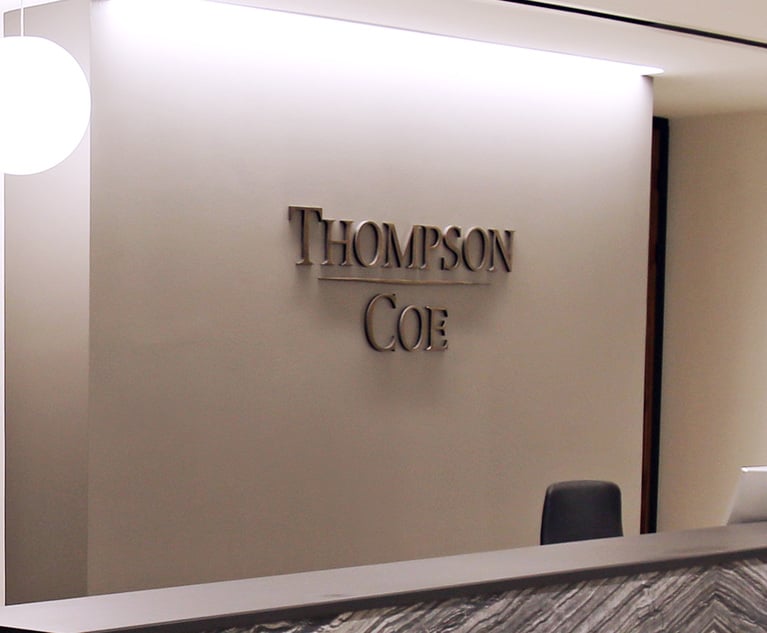Green Cards for Professional Employees: Competing Proposals for Reform in Congress
U.S. business immigration law is full of complex and outdated provisions, which affect American businesses and their foreign employees on a daily basis.…
April 14, 2020 at 12:12 PM
6 minute read
 Maka Hutson and Michelle Reed are counsel and partner, respectively, at Akin Gump. . (Photo: Courtesy Photo)
Maka Hutson and Michelle Reed are counsel and partner, respectively, at Akin Gump. . (Photo: Courtesy Photo)
U.S. business immigration law is full of complex and outdated provisions, which affect American businesses and their foreign employees on a daily basis. One such legal provision governs the allocation of "green cards," or permanent residence, to professional employees with at least a Bachelor's degree (or equivalent work experience). The Immigration and Nationality Act (INA), which has not been substantially amended since 1965, requires that no more than seven percent of all immigrants receiving green cards in any given year be from the same country (a so-called "per country quota"). Additionally, no more than 140,000 green cards can be issued per year for all employment-based categories, and both foreign-born employees and their immediate family members count against the cap, with family members accounting for approximately half of those green cards.
The combination of the per-country quotas and the cap on the total number of green cards available has led to extremely long delays for some foreign-born employees, especially those from India and China. According to a recent analysis from the Cato Institute, Indian nationals can expect to wait 54 years for a green card, even though they are sponsored for it by their American employer and are already working in United States on a temporary work visa. It is estimated that there are over 800,000 people on the waitlist for employment-based green cards, most of them Indian nationals.
There is bipartisan agreement in Congress that the current system is unsustainable, and before the COVID-19 pandemic spread around the world and virtually brought to a stop many aspects of the U.S. economy, two competing proposals to reform the green card system were introduced in Congress. When life begins to return to normal and Congress is able to legislate beyond the emergency relief bills currently being debated, it may revisit these proposals and could potentially pass legislation that will have tremendous effect on foreign workers and their U.S. employers.
The first proposal, called The Fairness for High Skilled Immigrants Act (H.R. 1044) and introduced by Rep. Zoe Lofgren, D-Calif., has already passed in the U.S. House of Representatives by an astounding 365-65 vote margin. There were no hearings held on the bill, and it received very little attention at the time of passing. The bill eliminates the per-country quotas in employment-based green card categories. The drafters' concern with such drastic action was that those who have been waiting in line for years — primarily nationals of India and China – will now use up all available green cards for the foreseeable future, and no green cards will be available for any other applicants because the total number of 140,000 per year would remain unchanged. This is why the bill included a "do no harm" provision that ensured that everyone with an employment-based green card petition that was approved prior to the bill passing would get their green card on the same timeline as if the bill had never been enacted. This compromise solution would preserve the status quo for those currently in line but would begin to alleviate the long wait for Indian and Chinese nationals.
A similar bill (S. 386) was introduced in the Senate by Sen. Mike Lee, R-Utah. Several senators expressed concerns about its provisions, including lack of protections from long waits for applicants in critically needed professions like nurses and physical therapists. With the COVID-19 outbreak accelerating in real time before Americans across the country, protecting healthcare workers from incredibly long delays in green card processing if they have an offer of employment from a U.S. hospital or other medical facility is an important legislative goal. Several such provisions protecting healthcare workers were added to the bill, but the "do not harm" provision was eliminated through the negotiations. The Senate bill now could make the situation better for Indian and Chinese nationals but worse for all other applicants. According to several estimates, because of the considerable wait list that would likely use up all the available green cards for at least several years, no new applicants would be eligible for a green card based on employment for at least five years, and the total backlog would only grow with time because the total number of green cards would not increase.
The second proposal is called the Resolving Extended Limbo for Immigrant Employees and Families (RELIEF) Act (S. 2603/H.R. 5327). It was introduced in the Senate by Sens. Dick Durbin, D-Ill., and Patrick Leahy, D-Vt., and by Rep. Donna Shalala, D-Fla., in the House. If enacted, the RELIEF Act would similarly eliminate the per-country quotas for employment-based immigrants but it would increase the number of available green cards by exempting immediate family members from annual green card limits. In other words, currently, if a professional employee who is married and has two minor children is sponsored for a green card, the family "uses up" four out of 140,000 employment-based green cards, but under the RELIEF Act it would only account for one green card. This will inevitably free up green cards for more foreign-born employees of U.S. businesses. The RELIEF Act also contains a "do no harm" provision to protect those already in line and "freezes" the age of minor children so that they do not "age out" after turning 21 if their parents' green card applications have not been approved yet. This means that they can receive green cards when their parents receive theirs, even if the children are over 21, as long as the application was filed when they were under 21.
Before the COVID-19 pandemic, there seemed to be momentum in Congress for a bill reforming the employment-based green card system. However, the American economy looked very different back then, with record lows in unemployment and many open professional positions. The overnight impact of COVID-19—resulting in record highs of unemployment and the tightest job market in recent history—will likely make it challenging for Congress to reach compromise on a bill that could be perceived as undercutting opportunities for unemployed U.S. citizens. Businesses that rely heavily on foreign employees for specialized labor thus may be left in the same unsustainable situation as before, perhaps for many years to come.
Maka Hutson and Michelle Reed are counsel and partner, respectively, at Akin Gump.
This content has been archived. It is available through our partners, LexisNexis® and Bloomberg Law.
To view this content, please continue to their sites.
Not a Lexis Subscriber?
Subscribe Now
Not a Bloomberg Law Subscriber?
Subscribe Now
NOT FOR REPRINT
© 2025 ALM Global, LLC, All Rights Reserved. Request academic re-use from www.copyright.com. All other uses, submit a request to [email protected]. For more information visit Asset & Logo Licensing.
You Might Like
View All


Eversheds Sutherland Adds Hunton Andrews Energy Lawyer With Cross-Border Experience
3 minute read
Ex-Marathon General Counsel Takes Legal Reins of Another Energy Company
Law Firms Mentioned
Trending Stories
- 1'It's Not Going to Be Pretty': PayPal, Capital One Face Novel Class Actions Over 'Poaching' Commissions Owed Influencers
- 211th Circuit Rejects Trump's Emergency Request as DOJ Prepares to Release Special Counsel's Final Report
- 3Supreme Court Takes Up Challenge to ACA Task Force
- 4'Tragedy of Unspeakable Proportions:' Could Edison, DWP, Face Lawsuits Over LA Wildfires?
- 5Meta Pulls Plug on DEI Programs
Who Got The Work
Michael G. Bongiorno, Andrew Scott Dulberg and Elizabeth E. Driscoll from Wilmer Cutler Pickering Hale and Dorr have stepped in to represent Symbotic Inc., an A.I.-enabled technology platform that focuses on increasing supply chain efficiency, and other defendants in a pending shareholder derivative lawsuit. The case, filed Oct. 2 in Massachusetts District Court by the Brown Law Firm on behalf of Stephen Austen, accuses certain officers and directors of misleading investors in regard to Symbotic's potential for margin growth by failing to disclose that the company was not equipped to timely deploy its systems or manage expenses through project delays. The case, assigned to U.S. District Judge Nathaniel M. Gorton, is 1:24-cv-12522, Austen v. Cohen et al.
Who Got The Work
Edmund Polubinski and Marie Killmond of Davis Polk & Wardwell have entered appearances for data platform software development company MongoDB and other defendants in a pending shareholder derivative lawsuit. The action, filed Oct. 7 in New York Southern District Court by the Brown Law Firm, accuses the company's directors and/or officers of falsely expressing confidence in the company’s restructuring of its sales incentive plan and downplaying the severity of decreases in its upfront commitments. The case is 1:24-cv-07594, Roy v. Ittycheria et al.
Who Got The Work
Amy O. Bruchs and Kurt F. Ellison of Michael Best & Friedrich have entered appearances for Epic Systems Corp. in a pending employment discrimination lawsuit. The suit was filed Sept. 7 in Wisconsin Western District Court by Levine Eisberner LLC and Siri & Glimstad on behalf of a project manager who claims that he was wrongfully terminated after applying for a religious exemption to the defendant's COVID-19 vaccine mandate. The case, assigned to U.S. Magistrate Judge Anita Marie Boor, is 3:24-cv-00630, Secker, Nathan v. Epic Systems Corporation.
Who Got The Work
David X. Sullivan, Thomas J. Finn and Gregory A. Hall from McCarter & English have entered appearances for Sunrun Installation Services in a pending civil rights lawsuit. The complaint was filed Sept. 4 in Connecticut District Court by attorney Robert M. Berke on behalf of former employee George Edward Steins, who was arrested and charged with employing an unregistered home improvement salesperson. The complaint alleges that had Sunrun informed the Connecticut Department of Consumer Protection that the plaintiff's employment had ended in 2017 and that he no longer held Sunrun's home improvement contractor license, he would not have been hit with charges, which were dismissed in May 2024. The case, assigned to U.S. District Judge Jeffrey A. Meyer, is 3:24-cv-01423, Steins v. Sunrun, Inc. et al.
Who Got The Work
Greenberg Traurig shareholder Joshua L. Raskin has entered an appearance for boohoo.com UK Ltd. in a pending patent infringement lawsuit. The suit, filed Sept. 3 in Texas Eastern District Court by Rozier Hardt McDonough on behalf of Alto Dynamics, asserts five patents related to an online shopping platform. The case, assigned to U.S. District Judge Rodney Gilstrap, is 2:24-cv-00719, Alto Dynamics, LLC v. boohoo.com UK Limited.
Featured Firms
Law Offices of Gary Martin Hays & Associates, P.C.
(470) 294-1674
Law Offices of Mark E. Salomone
(857) 444-6468
Smith & Hassler
(713) 739-1250






